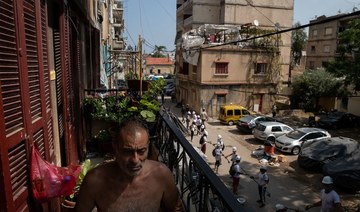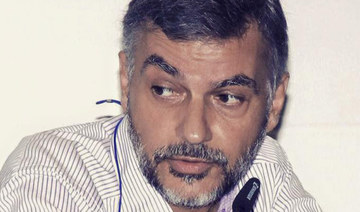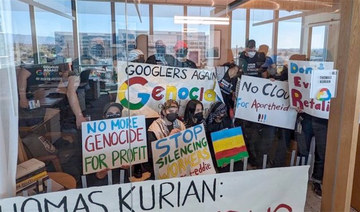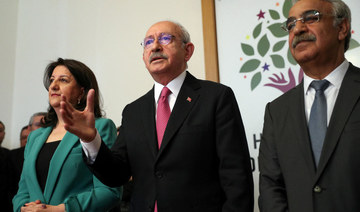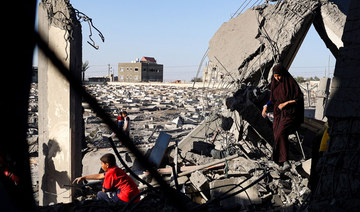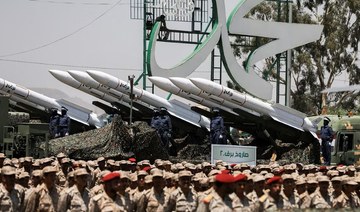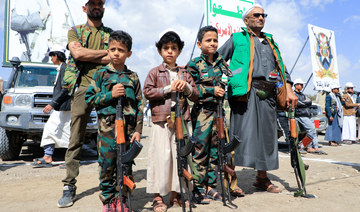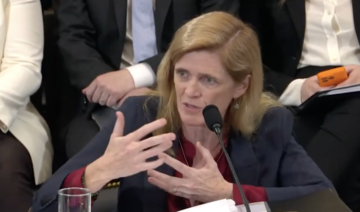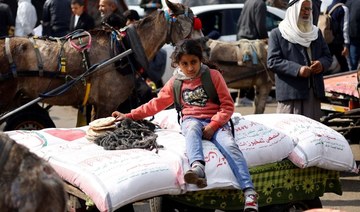BEIRUT: Arriving in Lebanon after last week’s deadly Beirut blast, US envoy David Hale bypassed politicians to head straight to a hard-hit neighborhood where young volunteers are helping people abandoned by their state.
At the volunteer hub dubbed the “Base Camp,” there is a “focus on getting things done,” Hale told a press conference after his tour.
He contrasted the hive of activity to the “dysfunctional governance and empty promises” of Lebanon’s political leaders, who face public outrage over the explosion of a vast stock of ammonium nitrate stored for years at Beirut’s port.
Volunteer efforts “could not only be tapped to rebuild Beirut but (also) to undertake necessary reforms that will bring the kind of transformation that is necessary for Lebanon,” Hale said.
In the wake of the August 4 explosion of a the huge chemical store that laid waste to whole Beirut neighborhoods, students and young professionals have ditched classes and day jobs to save lives, provide emergency support and start to rebuild.
Hale’s visit to the volunteer hub in the blast-hit Gemmayzeh district came days after French President Emmanuel Macron took a tour of the same street last Thursday, as well as meeting Lebanese leaders.
But while Macron was welcomed as a savior, it was clear that the heroes of the moment were the volunteers.
“I don’t know why (Hale) would do that second step and go to meet politicians,” said Wassim Bou Malham, 33, who leads a database management team at the Base Camp.
“The aid is happening here, the data collection is happening here, the cleaning is happening here, the reconstruction is happening here,” he told AFP.
Wearing face masks and neon vests, volunteers sounded like international experts as they explained how they were cleaning up their government’s mess.
In fluent English, they described 3D mapping operations, data collection and relief efforts organized since the cataclysmic blast.
Bou Malham, who spoke with Hale during the tour, is not a data expert but picked up useful experience managing client databases for two of Beirut’s biggest nightclubs.
After the blast tore through the city, wounding 6,500 people and displacing 300,000 from their homes, his skills became vital for the aid effort.
The digitised database developed by Bou Malham and his team of volunteers is now critical for sorting and delivering aid to thousands of blast survivors.
“We haven’t seen any government official or representative actually come in here and ask us if we need anything,” he said.
“It’s so funny that David Hale is the first.”
It is not only in the Base Camp that the state has been thin on the ground.
In the first hours after the explosion, civil defense teams were vastly outnumbered by young volunteers flooding the streets to help.
By the next day, the latter had set up a camp where they offered food, medicine, temporary shelter and repair services to thousands of blast victims, in partnership with several non-governmental groups.
Operations have continued to expand since.
A Base Camp relief hotline received more than 200 calls in the first two hours. Volunteers have assessed the damage to around 1,200 homes and installed at least 600 wooden doors.
“The work is going to speak for itself,” said Bushra, a 37-year-old volunteer.
Simmering anger against Lebanon’s leaders has flared since the blast, which appears to have been caused by years of state corruption and negligence.
With 171 people dead, it is widely seen as the most tragic manifestation yet of the rot at the core of the country’s political system.
Western donors too are fed up with Lebanon’s barons, who have for years resisted reforms demanded by the international community.
In a joint statement released after an international donor conference organized by France in the wake of the disaster, world leaders called for aid to be delivered directly to the Lebanese people.
USAID acting administrator, John Barsa, said at the time that American help “is absolutely not going to the government.”
USAID “will increase its financial support to civil society groups in Lebanon by 30 percent to $6.627 million,” Barsa said in a press briefing on Thursday.
At the volunteer camp in Gemmayzeh, it was clear that funding would be put to good use.
Ziad Al-Zein, arrives before volunteers start their shifts at 9:00 am to ensure the camp is clean and secure.
The 33-year-old was among the first groups of volunteers clearing debris in Gemmayzeh.
“We are not speacialists in crisis management or catastophe management. We are learning things as we go,” he said.
“There is no state,” he added. “We will not abandon our fellow Lebanese in these conditions.”
Streets before suits: US envoy vists Beirut’s ‘real’ rescue hub
https://arab.news/9mj8e
Streets before suits: US envoy vists Beirut’s ‘real’ rescue hub
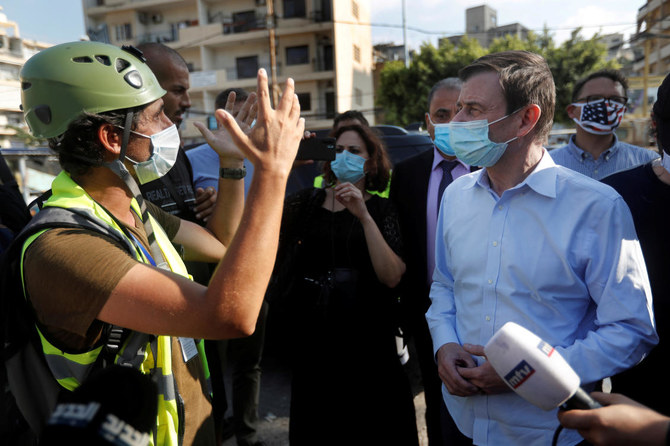
- Hale’s visit to the volunteer hub in the Gemmayzeh district came days after Macron took a tour of the same street last week
- Students and young professionals have ditched classes and day jobs to save lives and provide emergency support
Israeli army strikes 40 Hezbollah targets in south Lebanon
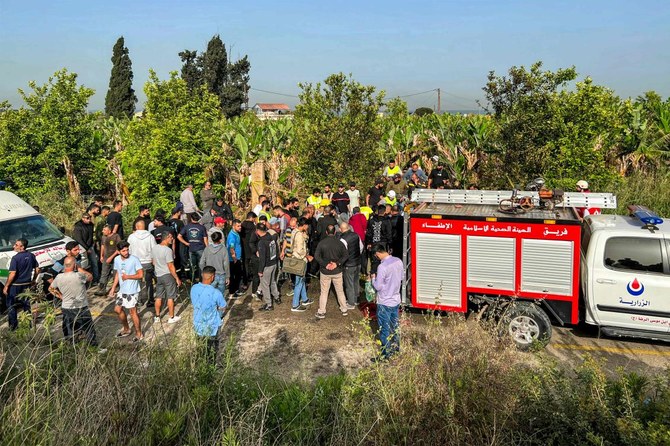
- Hezbollah has exchanged near-daily fire with the Israeli army
- Israel says 11 soldiers and eight civilians have been killed on its side of the border
Beirut: The Israeli army said Wednesday it struck 40 Hezbollah targets in southern Lebanon as near-daily exchanges of fire rage on the border between the two countries.
“A short while ago, IDF (army) fighter jets and artillery struck approximately 40 Hezbollah terror targets” around Aita Al-Shaab in southern Lebanon, including storage facilities and weaponry, the army said in a statement.
Lebanon’s Iran-backed Hezbollah movement said it fired a fresh barrage of rockets across the border earlier in the day after a strike blamed on Israel killed two civilians.
The group had already fired rockets at northern Israel late on Tuesday “in response” to the civilian deaths.
Hezbollah has exchanged near-daily fire with the Israeli army since its ally Hamas carried out an unprecedented attack on Israel on October 7, triggering war in Gaza.
It has stepped up its rocket fire on Israeli military bases in recent days.
Hezbollah fighters fired “dozens of Katyusha rockets” at a border village in northern Israel “as part of the response to the Israeli enemy’s attacks on... civilian homes,” the group said in a statement.
On Tuesday, rescue teams said an Israeli strike on a house in the southern village of Hanin killed a woman in her fifties and a girl from the same family.
Since October 7, at least 380 people have been killed in Lebanon, mostly Hezbollah fighters but also 72 civilians, according to an AFP tally.
Israel says 11 soldiers and eight civilians have been killed on its side of the border.
Turkish minister warns pro-Kurdish party it could face moves to ban it
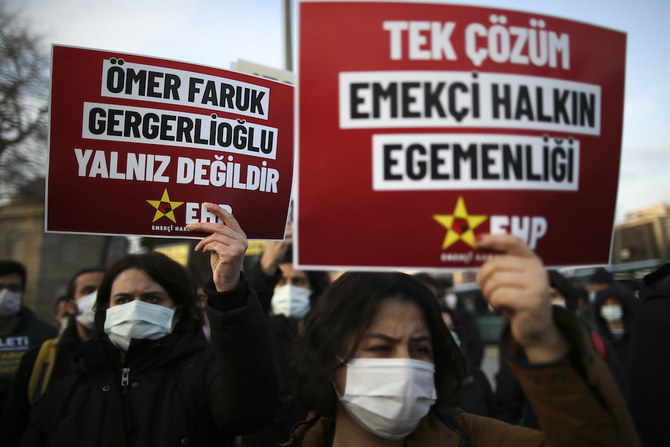
- “In the past, closure cases were opened against parties for supporting terrorism,” Justice Minister Yilmaz Tunc told reporters in Ankara
- “Therefore, we say that if the DEM Party follows the same path, then it will face the same treatment”
ISTANBUL: Turkiye’s justice minister warned the country’s main pro-Kurdish DEM party on Wednesday that it would face the risk of legal action, and even a closure case like its predecessor, if it did not distance itself from Kurdish militants.
DEM, parliament’s third largest party, was established last year as a successor to the Peoples’ Democratic Party (HDP), which is facing the prospect of closure over alleged militant links in a court case following a years-long crackdown.
“In the past, closure cases were opened against parties for supporting terrorism,” Justice Minister Yilmaz Tunc told reporters in Ankara, noting that some parties had been banned and that other cases were ongoing.
“Therefore, we say that if the DEM Party follows the same path, then it will face the same treatment,” he said. “We say keep your distance from terrorism if you do not want to face such a legal process.”
Another court had been expected to announce a verdict this month in a case trying jailed former HDP leaders and officials over 2014 protests triggered by a Daesh attack on the Syrian Kurdish town of Kobani. That verdict was postponed.
“They should not wag their fingers at us. I repeat, the policy of closure, blackmail and threats is over,” DEM Party co-chair Tuncer Bakirhan said on Wednesday in the wake of a call from a government ally to ban the DEM Party.
Critics say Turkish courts are under the influence of the government and President Tayyip Erdogan, which he and his AK Party (AKP) deny.
Both prosecutors and the government accuse the HDP of ties to the militant Kurdistan Workers Party (PKK), which is deemed a terrorist group by Turkiye, the United States and European Union. The HDP denies having any connections with terrorism.
The PKK launched an insurgency against the Turkish state in 1984 and more than 40,000 people have been killed in the conflict. A peace process between Ankara and the PKK fell apart in 2015 and in a subsequent crackdown on the HDP thousands of its officials and members have been arrested and jailed.
UAE, Bahrain call for joint work to contain tensions threatening regional stability
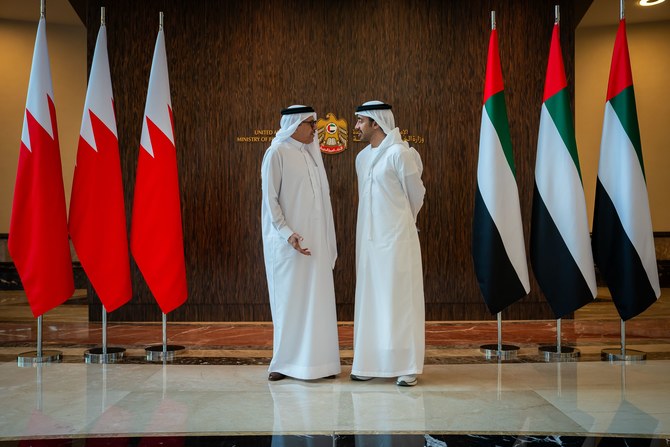
- During a meeting in Abu Dhabi, the ministers discussed the fraternal relations between UAE and Bahrain
DUBAI: UAE Minister of Foreign Affairs Sheikh Abdullah bin Zayed Al Nahyan received his Bahraini counterpart Dr. Abdul Latif bin Rashid Al Zayani in Abu Dhabi on Wednesday.
Sheikh Abdullah bin Zayed welcomed the Bahraini Foreign Minister, and during the meeting held at the ministry’s headquarters in Abu Dhabi, they discussed the fraternal relations between the two countries, and ways to enhance Emirati-Bahraini cooperation at various levels, WAM reported.
Sheikh Abdullah stressed during the meeting that the UAE and Bahrain are linked by historical relations that are becoming more established, developed and growing, and that they also constitute an important tributary to joint Gulf and Arab work.
He also stressed that the current challenges facing the region require intensifying cooperation, coordination and joint work to contain all tensions that threaten its stability, security and safety of its people.
A blast near a ship off Yemen may mark a new attack by Houthis after a recent lull
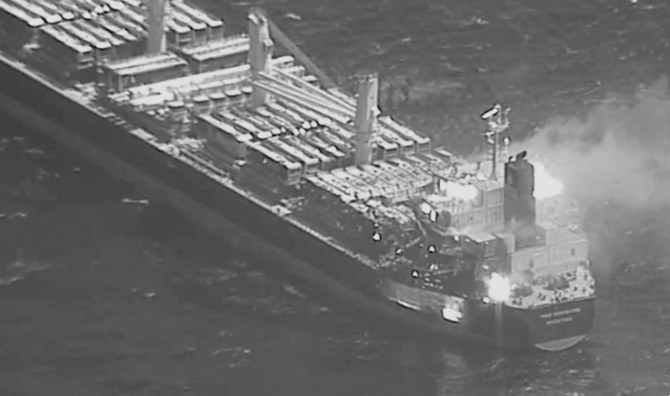
- Houthis have launched more than 50 attacks on shipping, seized one vessel and sank another since November
- The explosion happened some 130 kilometers southeast of Djibouti in the Gulf of Aden
JERUSALEM: A ship near the strategic Bab El-Mandeb Strait saw an explosion in the distance Wednesday, marking what may be a new attack by Yemen’s Houthis through the crucial waterway for international trade.
The explosion, reported by the British military’s United Kingdom Maritime Trade Operations center, comes after a relative lull from the Houthis after they launched dozens of attacks on shipping in the region over Israel’s ongoing war on Hamas in the Gaza Strip.
The Houthis did not immediately claim responsibility for the blast, but suspicion fell on the group as they’ve repeatedly targeted ships in the same area. It typically takes the Houthis several hours before acknowledging their assaults.
The explosion happened some 130 kilometers southeast of Djibouti in the Gulf of Aden.
“The master of a merchant vessel reports an explosion in the water a distance form the vessel,” the UKMTO said. “Veseel and crew reported safe. Authorities are investigating.”
The private maritime security firm Ambrey separately reported the apparent attack.
The Houthis have launched more than 50 attacks on shipping, seized one vessel and sank another since November, according to the US Maritime Administration.
Houthi attacks have dropped in recent weeks as the militia has been targeted by a US-led airstrike campaign in Yemen and shipping through the Red Sea and Gulf of Aden has declined because of the threat. American officials have speculated that they may be running out of weapons as a result of the US-led campaign against them and firing off drones and missiles steadily in the last months.
The Houthis have said they would continue their attacks until Israel ends its war in Gaza, which has killed more than 34,000 Palestinians there. The war began after Hamas-led militants attacked Israel on Oct. 7, killing 1,200 people and taking some 250 others hostage.
The ships targeted by the Houthis largely have had little or no direct connection to Israel, the US or other nations involved in the war. The Houthis have also fired missiles toward Israel, though they have largely fallen short or been intercepted.
Gaza could surpass famine thresholds in six weeks, WFP official says
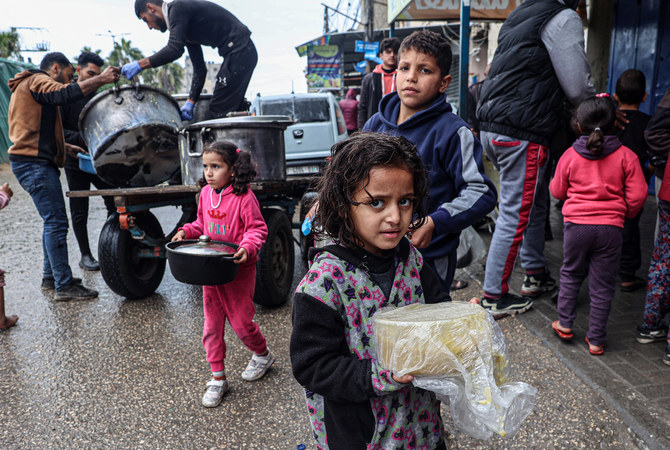
- A UN-backed report published in March said famine was imminent and likely to occur by May in northern Gaza
GENEVA: The Gaza Strip could surpass famine thresholds of food insecurity, malnutrition and mortality in six weeks, an official from the World Food Programme said on Wednesday.
“We are getting closer by the day to a famine situation,” said Gian Caro Cirri, Geneva director of the World Food Programme (WFP).
“There is reasonable evidence that all three famine thresholds — food insecurity, malnutrition and mortality — will be passed in the next six weeks.”
A UN-backed report published in March said that famine was imminent and likely to occur by May in northern Gaza and could spread across the enclave by July. On Tuesday, a US official said the risk of famine in Gaza, especially in the north, was very high.
Cirri was speaking at the launch of a report by the Global Network Against Food Crises, an alliance of humanitarian and development actors including United Nations agencies, the World Bank, the European Union and the United States.
In its report, the network described the 2024 outlook for the Middle East and Africa as extremely concerning due to the Gaza war and restricted humanitarian access, as well as the risk of the conflict spreading elsewhere in the region.
“As for Gaza, the conflict makes it difficult and sometimes impossible to reach affected people,” Cirri said.
“We need to scale up massively our assistance... But under the current conditions, I’m afraid the situation will further deteriorate.”
The United Nations has long complained of obstacles to getting aid in and distributing it throughout Gaza in the six months since Israel began an aerial and ground offensive against Gaza’s ruling Islamist militant group Hamas.
Israel has denied hindering supplies of humanitarian aid and blames aid agencies for inefficiencies in distribution.
Israel’s military campaign has reduced much of the territory of 2.3 million people to a wasteland with a humanitarian disaster unfolding since Oct. 7, when Hamas ignited war by storming into southern Israel.
Cirri said that the only way to steer clear of famine in Gaza was to ensure immediate and daily deliveries of food supplies.
“They’ve been selling off their belongings to buy food. They are most of the time destitute,” he said.
“And clearly some of them are dying of hunger.”





